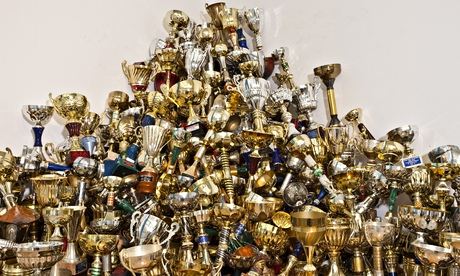
In a few hours, the Folio prize's challenge to the Man Booker becomes real as it announces its first winner; the inaugural longlist of the Baileys women's prize, last year the Women's prize and formerly the Orange, was announced on Friday. This sets up a four-way clash in literary fiction, and rivalries between prizes are just as vigorous as those between shortlisted books …
Literary fiction
Main players Man Booker, Baileys, Costa novel, Folio.
Others Independent foreign fiction, Goldsmiths, James Tait Black.
Recent activity Booker changed eligibility rules ahead of Folio's launch, so Americans are eligible for both. Baileys – first longlist just announced – is Orange relabelled after sponsor change.
Pros/cons Booker has pluses (prestige) and minuses (fusty image) of being No 1. Folio has challenger energy but lacks clear differentiation from rival. Both risk being US-dominated like Baileys. Costa remains British/Irish residents only.
Least likely to pick Jonathan Franzen (Booker); whatever the previous Booker winner was (Folio, Costa); British woman over 60, eg Hilary Mantel (Baileys).
Poetry
Players TS Eliot, Forward (three awards), Costa poetry.
Others National poetry competition, Ted Hughes.
Recent activity Last year's Forward ceremony controversially saw poems read by actors, not poets. Alice Oswald withdrew from TS Eliot in 2011 over investment firm sponsor.
Pros/cons TS Eliot is judged only by fellow poets, possibly adding credibility but prompting suspicions of cosiness. Forward's revamp suggests awareness it had got into a rut. Costa has less prominence because it is one of a cluster of prizes, but Christopher Reid and Jo Shapcott have recently gone on to win overall award.
Least likely Ian McMillan (TS Eliot); Geoffrey Hill (Forward, Costa).
Short stories
Players BBC national story, Sunday Times EFG.
Other Costa (unpublished stories only, public vote).
Recent activity Only launched in 2010, the paper's award has shortened its previously overlong title.
Pros/cons Sunday Times has huge purse for 6,000-word-max tale (£30,000) and international stars, whereas BBC (£15,000) is UK only. BBC guarantees Radio 4 exposure.
Least likely Senior male novelist (BBC); anyone British (Sunday Times).
First novels
Players Betty Trask, Costa first novel.
Others Desmond Elliott (since 2008), Guardian first book (non-fiction also eligible), Dylan Thomas (new writers).
Recent activity Costa 2013 debut winner, Nathan Filer, also won £25,000 overall award – first such double since 2006.
Pros/cons Betty Trask has strong talent-spotting record, eg Eleanor Catton (pictured), but only because judges ignore founder's rubric requiring "romantic or traditional" fiction. Costa choices can seem capricious, and rarely "endorsed" by other prize panels.
Least likely Anything Betty would have enjoyed (Trask); heavily promoted and "promotable" authors (Costa).
Science books
Players Royal Society Winton, Wellcome.
Other Samuel Johnson (in theory).
Recent activity Wellcome just relaunched with more money (£30,000), high-profile judges and Elizabeth Gilbert on shortlist.
Pros/cons Royal Society has wider remit, but revitalised rival threatens to make it look blokeish, donnish and stuffy. Wellcome is ostensibly restricted to health-related titles, but eclectic shortlist implies definition-creep.
Least likely A woman, or Brian Cox (Royal Society); What I Learned In My Lab by A Boffin (Wellcome).
Non-fiction
Players Samuel Johnson, Costa biography.
Others Specialist non-fiction (eg science, history) awards, debut awards.
Recent activity Samuel Johnson is no longer BBC-sponsored but still has some TV coverage, like Booker and unlike Costa.
Pros/cons Not a true genre head-to-head, but last two SJ winners have been biographical and in 2013 the same book (by Lucy Hughes-Hallett) won both accolades. SJ has yet to choose a book with popular appeal, while overlooking non-fic bestsellers by Richard Dawkins and Daniel Kahneman. By forcing them to compete with memoirs, Costa runs risk of snubbing major biographies.
Least likely A scientist (Samuel Johnson); 900-page old-fashioned life of British or US literary giant or politician (Costa).
Children's fiction
Players Carnegie medal, Guardian children's fiction.
Recent activity Venerable Carnegie looks a little less staid after wins for Patrick Ness (twice) and Neil Gaiman.
Pros/cons Carnegie judging process, by conclave of librarians, is relatively shadowy. Guardian is judged by peers and can't be won twice – so even if Philip Pullman's next book is epoch-making, he won't be eligible. Retains air of cheeky, radical challenger, despite considerable overlap in winners.
Least likely Stephenie Meyer, JK Rowling (Carnegie); Jeff Kinney, JK Rowling (Guardian).

